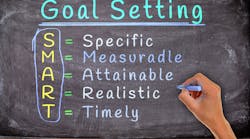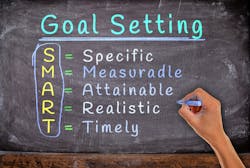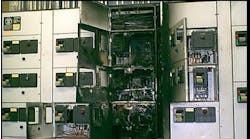Whether you’re a maintenance manager or first-line supervisor, following these five principles can help you achieve your best in managing maintenance performance.
1. Know the goals. A typical maintenance manager isn’t managing, but reacting. For maintenance supervisors, that applies even more so. This situation means maintenance is managing you, instead of the other way around, and you stand no chance of reaching your performance goals — if there are any, and if you even know what they are.
2. Clearly define the goals. A goal such as “reduce downtime” has no actionable aspect to it. It is of little or no value. Change that to “reduce downtime on line three by 15%,” and you have a measurable goal. Ensure that the goal you are setting is achievable, something you can assess after thinking about why that line has downtime in the first place and how you can realistically address the causes. It’s even better if the goals are directed at specific attributes rather than outcomes of complex situations. For example, “Reduce winding temperature differential (to ambient) by 20 degrees on all critical motors.”
3. Include process and training goals. You need goals that contribute to desired outcomes. For example, “Increase predictive maintenance on Line Six to 50% of maintenance effort” or “Train and certify two electricians as Level II thermographers.”
4. Clearly articulate the goals. If you can’t talk the talk, the people reporting to you won’t understand what it is they are supposed to do. They’ll never walk the walk, because they don’t know where they are supposed to go or how to get there. State the goals in simple, actionable language that lends itself to measurement. You can’t, for example, measure “Establish a world-class maintenance organization,” but you can measure “Solve all power anomalies in the annex building within the next 90 days.” Notice the time factor in this example. You should have a time factor assigned to each goal.
5. Establish meaningful metrics. You can’t manage what you can’t measure. But the measurements don’t help unless they are meaningful. When you define your goals, do so with “how to measure progress and/or success” in mind. You may want better communications with production, for example. It will be difficult to measure “better,” but you can measure, “Establish instant radio communication system between production supervisors and crew leaders.”





